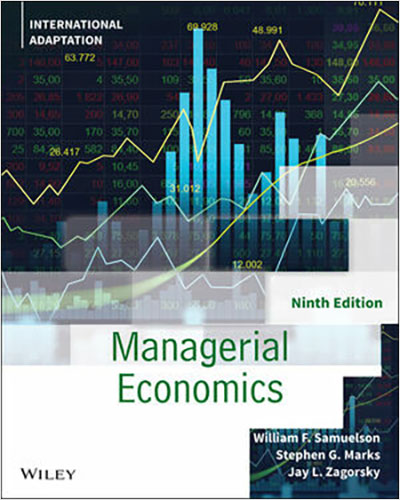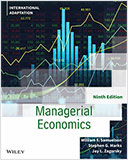
Managerial Economics introduces undergraduates, MBAs, and executives to the complex decision problems today's managers face, providing the knowledge and analytical skills required to make informed decisions and prosper in the modern business environment. Going beyond the traditional academic approach to teaching economic analysis, this comprehensive textbook describes how practicing managers use various economic methods in the real world. Each chapter opens with a central managerial problem-challenging readers to consider and evaluate possible choices-and concludes by reviewing and analyzing the decision through the lens of the concepts introduced in the chapter.
Extensively updated throughout, this International Adaptation makes use of new central managerial problems and case studies from across the world to discuss the foundational principles of managerial economics, illustrate key concepts, and strengthen students' critical thinking skills. Favoring practical skills development over complicated theoretical discussion, the book includes mini-problems and spreadsheet problems that reinforce students' quantitative understanding without overwhelming them with an excessive amount of mathematics.
Managerial Economics introduces undergraduates, MBAs, and executives to the complex decision problems today's managers face, providing the knowledge and analytical skills required to make informed decisions and prosper in the modern business environment. Going beyond the traditional academic approach to teaching economic analysis, this comprehensive textbook describes how practicing managers use various economic methods in the real world. Each chapter opens with a central managerial problem--challenging readers to consider and evaluate possible choices--and concludes by reviewing and analyzing the decision through the lens of the concepts introduced in the chapter.Extensively updated throughout, this International Adaptation makes use of new central managerial problems and case studies from across the world to discuss the foundational principles of managerial economics, illustrate key concepts, and strengthen students' critical thinking skills. Favoring practical skills development over complicated theoretical discussion, the book includes mini-problems and spreadsheet problems that reinforce students' quantitative understanding without overwhelming them with an excessive amount of mathematics.
CHAPTER 1 Introduction to Economic Decision Making
CHAPTER 2 Optimal Decisions Using Marginal Analysis
CHAPTER 3 Demand Analysis and Optimal Pricing
CHAPTER 4 Estimating and Forecasting Demand
CHAPTER 5 Production
CHAPTER 6 Cost Analysis
CHAPTER 7 Perfect Competition
CHAPTER 8 Monopoly
CHAPTER 9 Oligopoly
CHAPTER 10 Game Theory and Competitive Strategy
CHAPTER 11 Regulation, Public Goods, and Benefit-Cost Analysis
CHAPTER 12 The Economics of Non-Profit Organizations
CHAPTER 13 Decision Making under Uncertainty
CHAPTER 14 The Value of Information
CHAPTER 15 Asymmetric Information and Organizational Design
CHAPTER 16 Bargaining and Negotiation
CHAPTER 17 Linear Programming
Index




